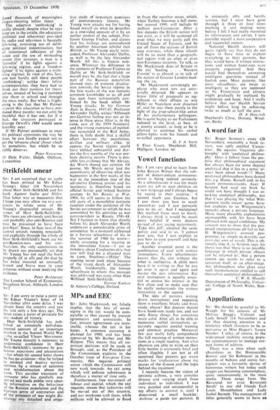MPs and EEC
Sir: John Mackintosh, MP, falsely implies that the loss of sover- eignty in the EEC would be com- parable to that caused by present agreements and constraints. In fact, present agreements are term- inable, whereas the EEC is for keeps. A common currency is planned for 1980, and has been approved by Mr Barber and Mr Rippon. This means that all im- portant decisions will be made in Brussels, and, as the President of the Commission explains in the October issue of European Com- munity, this requires political union which the Commission will now work towards. An EEC army which will enforce submission is therefore a matter of time only.
Furthermore, free movement of labour and capital, which the EEC requires, means that industries will be moved out of this country, and our workmen with them, while millions will be allowed to flood in from the member states, which, when Turkey becomes a full mem- ber around 1990, will include 60 million non-Europeans. After a few decades the British nation will not exist, as it will be scattered all over what we may justly call the United States of Eurasia, and be cut off from the nations of British race overseas, while these islands will be no more than a geograph- ical region with an alien or even non-European majority. To talk, as Mr Mackintosh does of Britain in the EEC 'leading . . . Western Europe' is as absurd as to talk of the nation of Greater London lead- ing the UK.
Mr Mackintosh unwittingly ex- plains why most MPS are univ- ersally despised. He appears to know little of proposals as sig- nificant in their effects as any Hitler or Napoleon ever dreamed of. and he sees them purely in the light of the prep-school-like antics of his parliamentary colleagues. He is quite happy to see Parliament reduced to the level, at best, of a county council, as long as he is allowed to continue his verbal pillow-fights with his friends and so-called opponents.
G. J. A. Stern 6 Eton Court. Shepherds Hill, Highgate, London N6






































 Previous page
Previous page